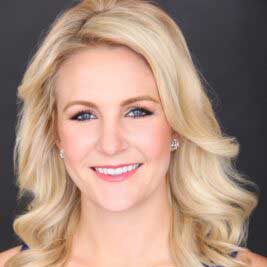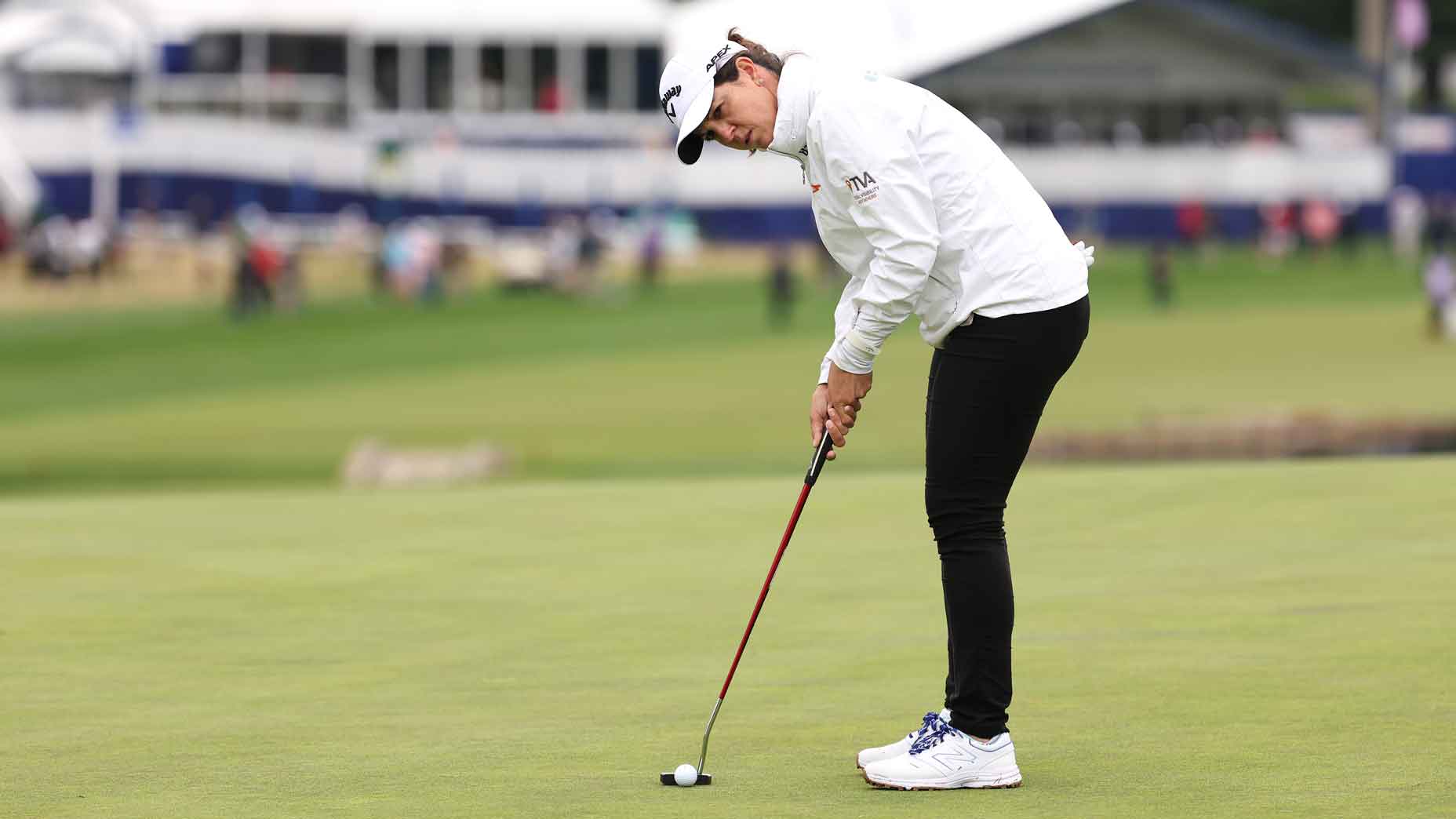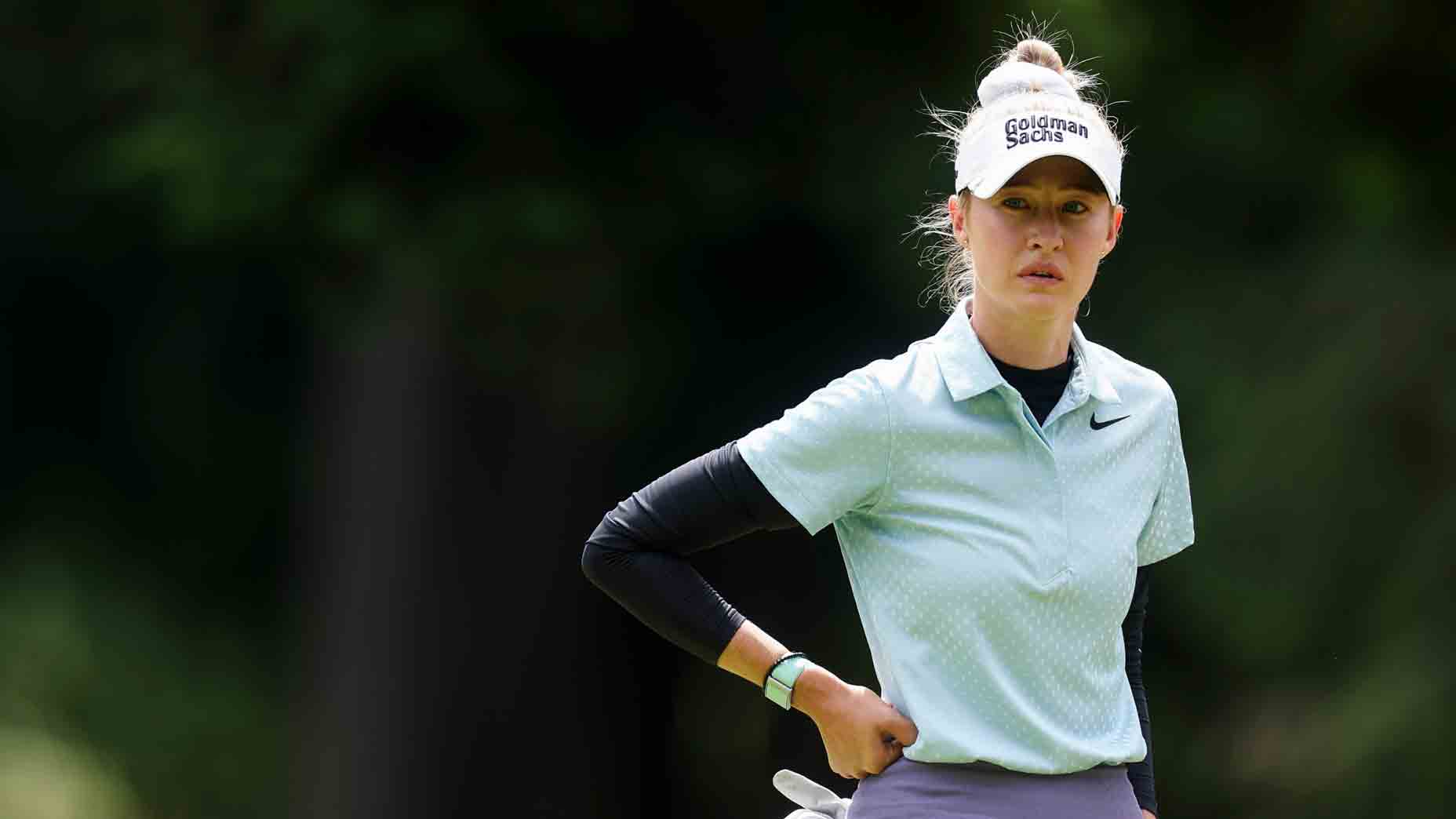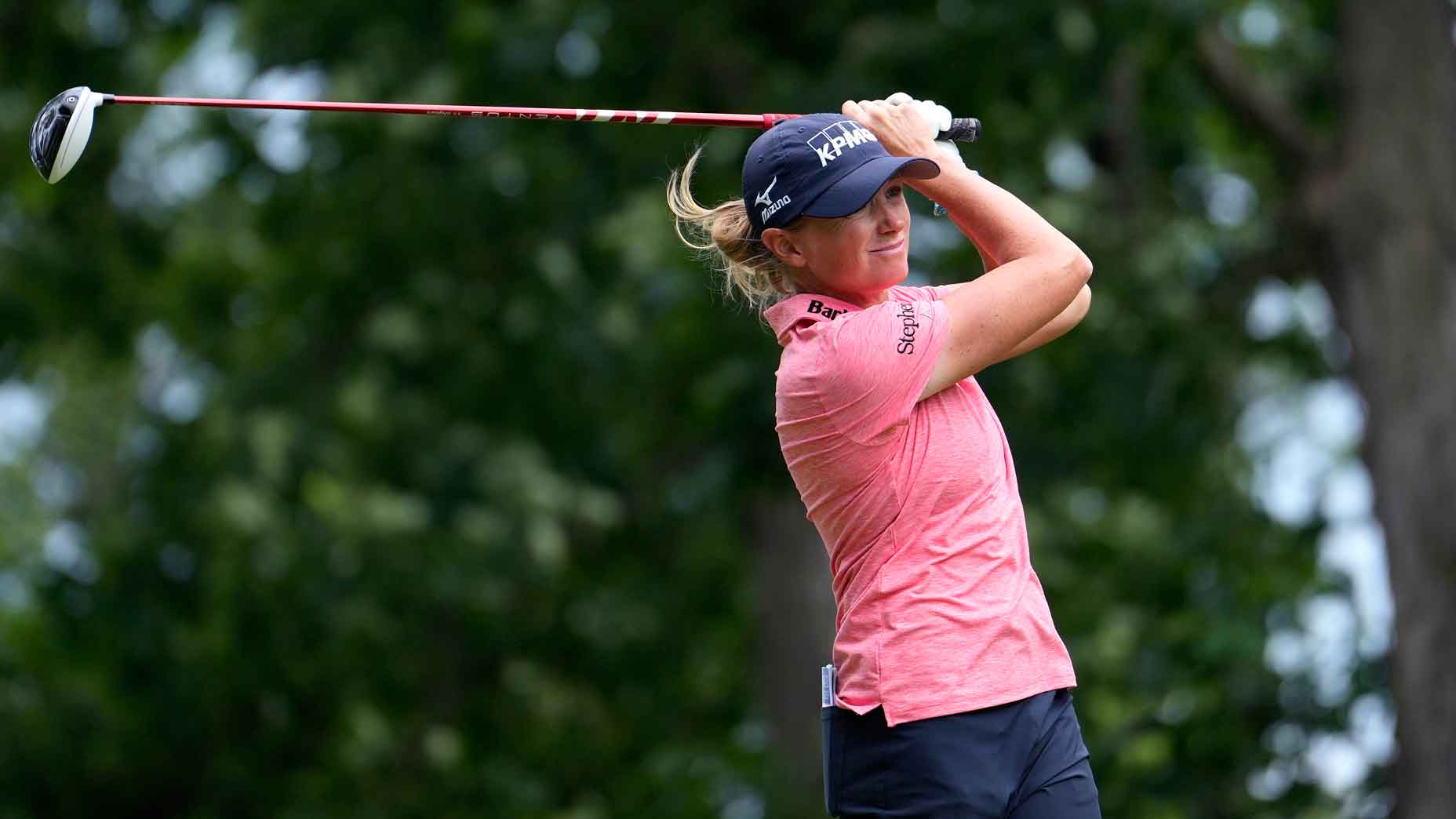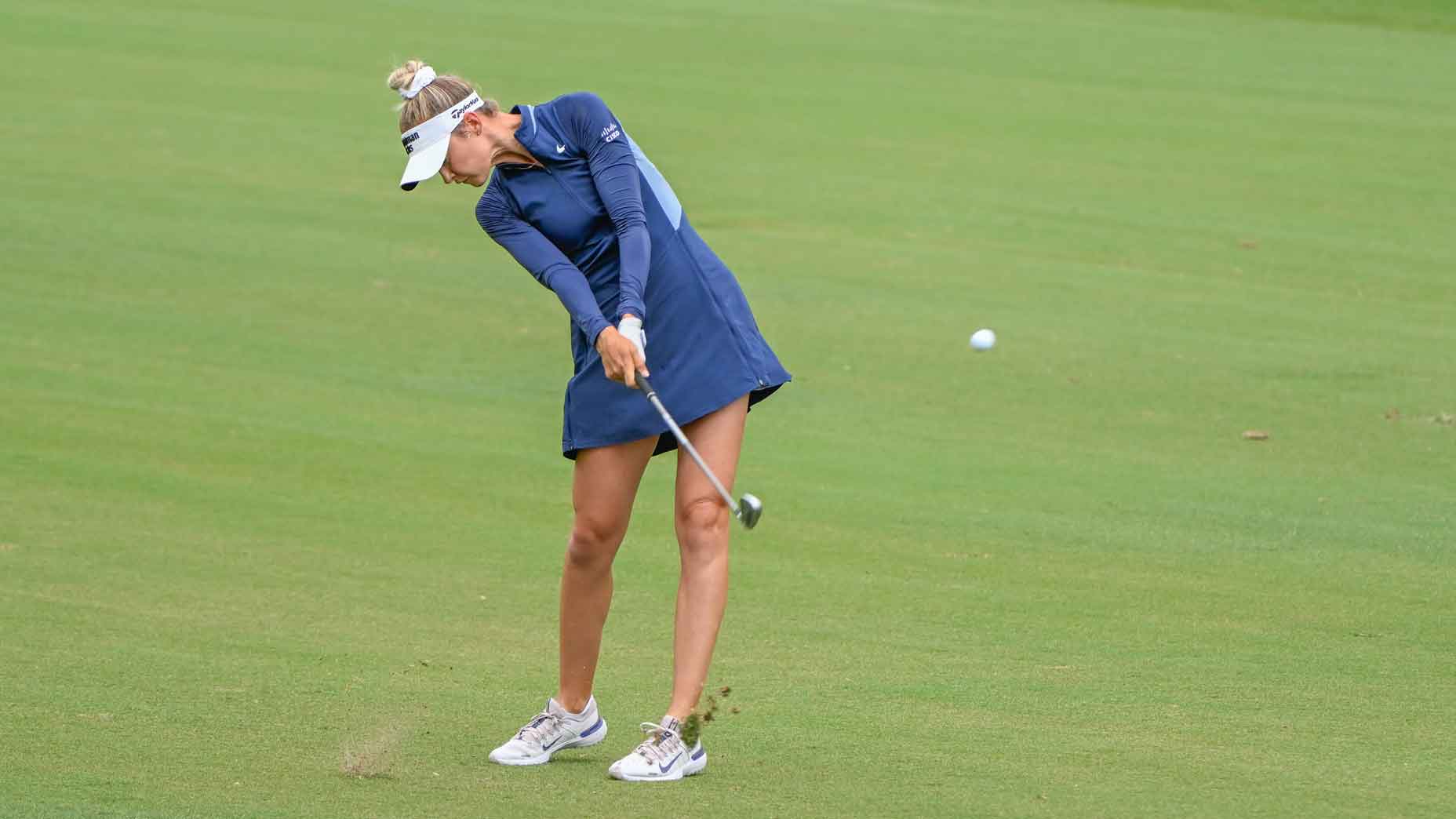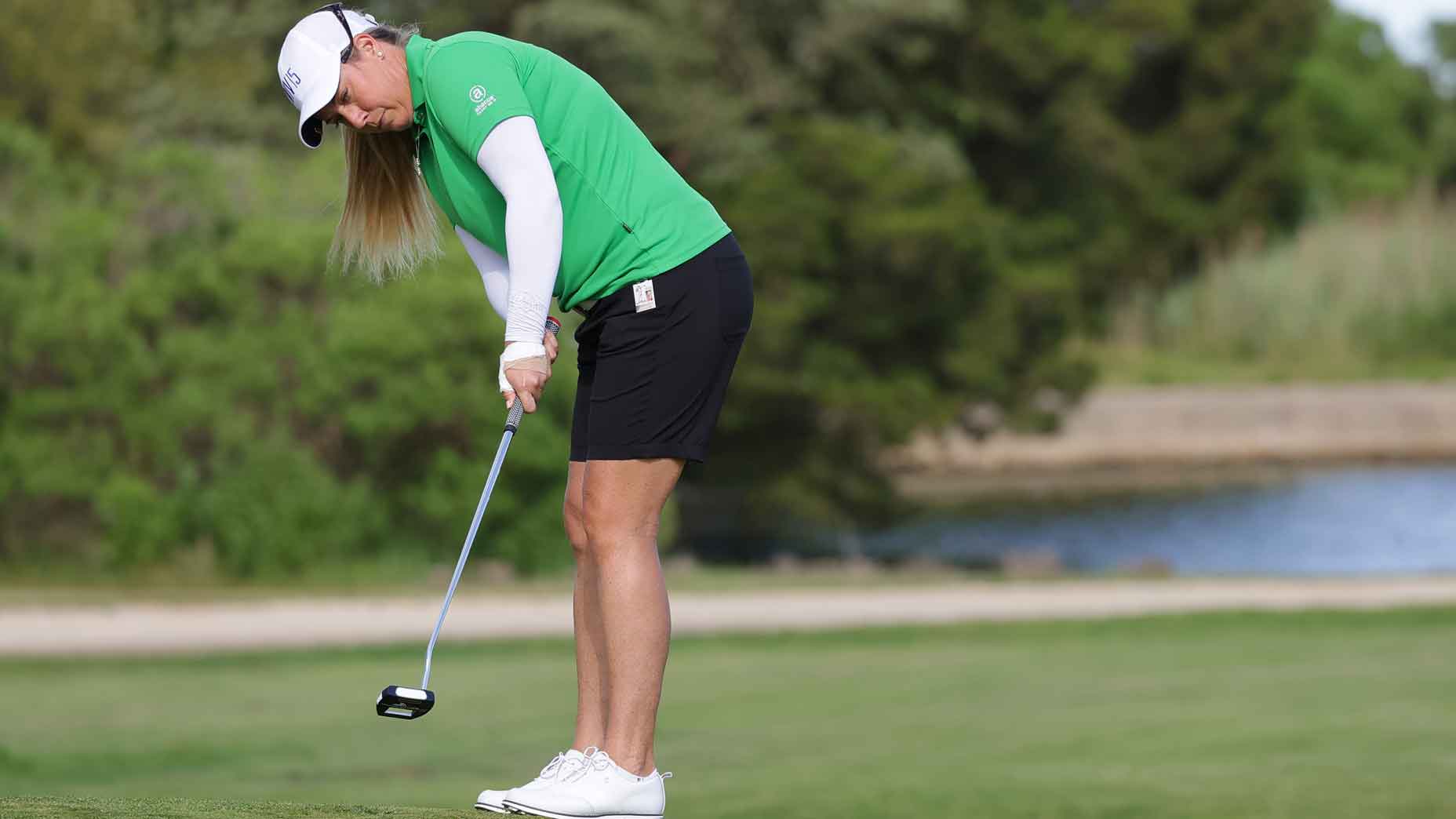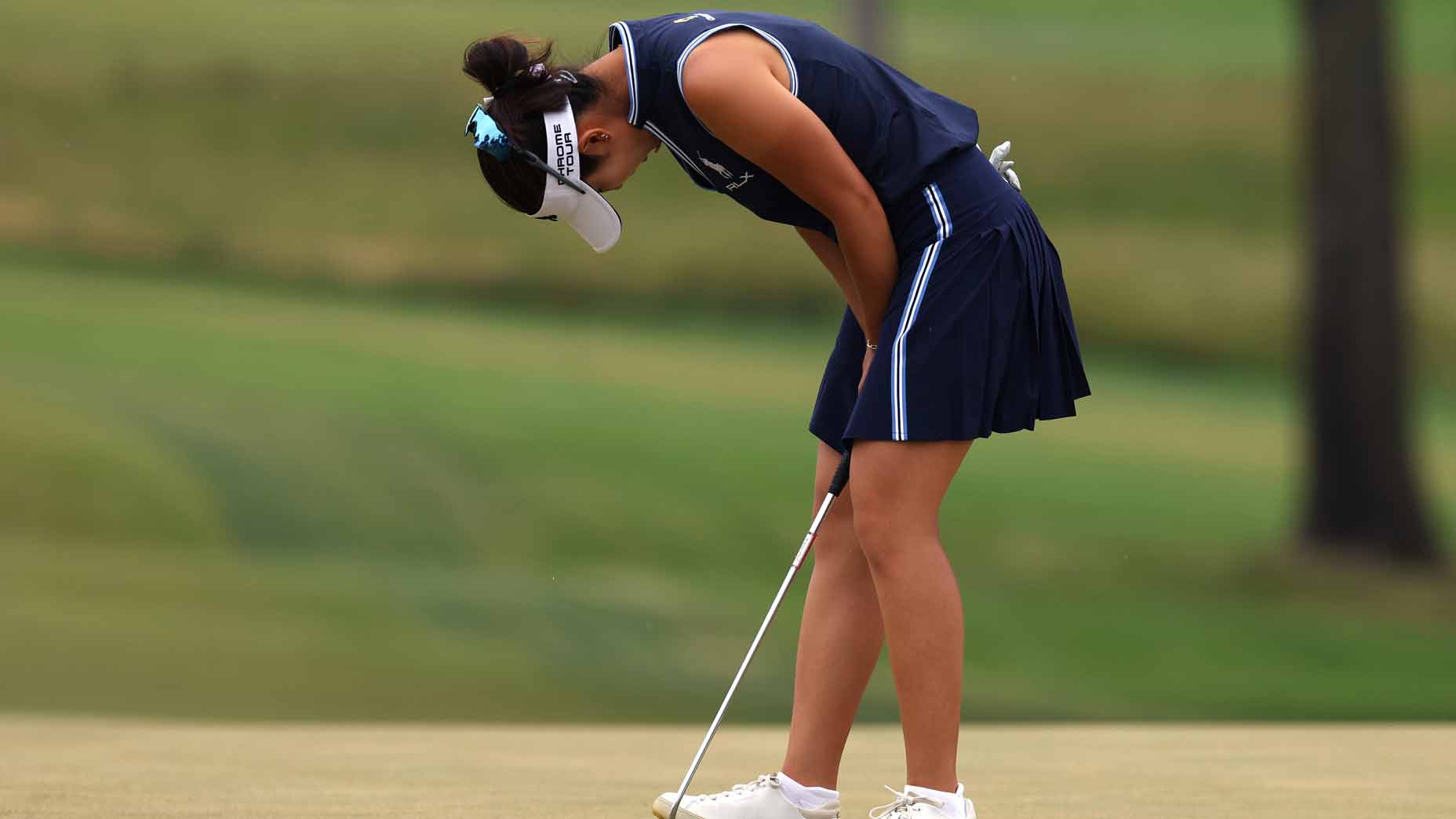Annika Sorenstam on how motherhood has changed her, and sharing the spotlight with son Will
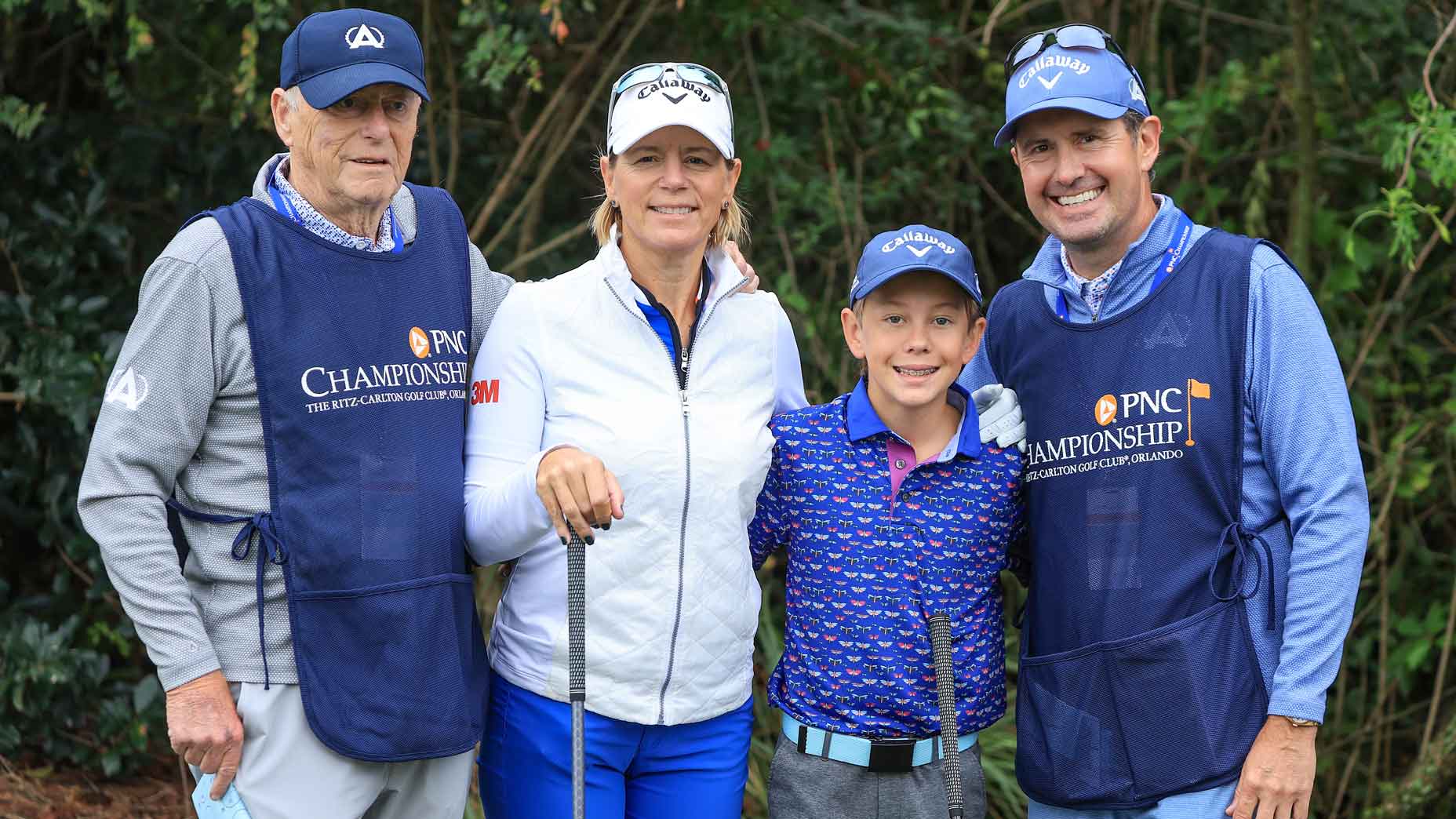
Annika Sorenstam poses with her father, Tom, her son, Will, and her husband, Mike, at the 2023 PNC Championship.
Getty Images
Happy Mother’s Day! This week, we’re highlighting the experiences of some of the most high-profile women in the game, each of whom share a meaningful title: Mom. Next up: LPGA legend Annika Sorenstam.
ICYMI: Mother’s Day gift guide: 35 fabulous gifts for golf-loving moms
***
WHEN ANNIKA SORENSTAM stepped away from competitive golf nearly 16 years ago, she was still at the height of her powers. In fact, her announcement that the 2008 season would be her last was made just days after she posted a dominant seven-stroke victory at the Michelob Ultra Open — her third victory of that year.
Then 38 years old, Sorenstam had notched a total of 72 LPGA wins, including 10 majors. She’d spent 61 weeks as the top-ranked women’s player in the world. But she had other life goals: namely, raising a family. Just weeks after the end of the 2008 season, Sorenstam married her husband, Mike McGee, and the couple welcomed their first child, Ava, in September 2009, followed by their son, Will, in 2011.
Then, after more than a decade away from the competitive game, Sorenstam made a grand return, winning the inaugural U.S. Senior Women’s Open in 2021. And for the last two years, Sorenstam has been a highlight at the annual PNC Championship, playing alongside Will.
In a recent interview with GOLF, Sorenstam revisited her decision to step away from the game, the challenges of balancing motherhood and career, and what it’s like to help her children foster a love for the game that has meant so much to her.
GOLF: Let’s go back to 2008. You were 38 years old, making a momentous change and transition in your life. At the time, did you feel like you had to retire from pro golf in order to create the family life that you wanted?
Annika Sorenstam: No. I didn’t feel like I needed to. I think my changes in life just made me realize there are other things to do, and it was just flowing together. I realized that there’s really nothing more I wanted to achieve in my business life. And looking forward to this new chapter, getting married and starting a family and a business venture, I was excited about that. That made me realize that, “Hey, this is much more than just competing.”
In those early days, was hard to put the clubs away?
No. I think because I gave it my all every single day that I just came to a point where you get tired. And the motivation wasn’t there. And it was just not exciting and I wasn’t hungry. I was just more excited about other things. So that’s where I put all my energy. Did it feel weird? Yeah. It did, because I’ve been doing this for so long. But I was busy with other things, so it took its place. I wasn’t sitting at home wondering what to do or being bored.
Had you always dreamed of and envisioned yourself as a mother?
I didn’t have every chapter of my life scripted since I was a little girl. I think a lot of it just evolved. I think in my case, I was so focused on my career that time just went by so quickly. It’s like all of a sudden, I remember — you know, you go to the doctor and they kept saying, “Are you thinking about a family?” And I was like, “Well, you know what I’m thinking about? Winning a major.” It’s not on my mind. And then you start realizing, “Well, hello. Am I getting old for other things?” It wasn’t until I met Mike that I started to see a future with him and family with him. And so then it was like, “Well, maybe now is the time.” I mean, I had hoped to have a family. But you have to have the right team and the right timing. The right place. And I felt that when Mike and I were getting serious that this was shaping up to be what I was hoping for.
Lydia Ko has been clear from the beginning that golf isn’t the end-all, be-all for her. Lorena Ochoa retired at age 30, shortly after you, with plans to start a family. Do you feel like you set a precedent for those who came after you, that it’s important to pursue other things?
There have been trailblazers on the LPGA for quite some time and we all do things differently. I never saw myself as a mother on tour. But that was just me, because I know how focused I am when I get to tournaments. I know how I have my practice regimen and I have my routines. And I just couldn’t see how I could marry that with having a family on tour. But I’ve seen some other LPGA players that have been very successful there. When it comes just for me stepping away, it was just because of that reason: Now I want to be a mom. And as you know, a mom is a full-time job. And I didn’t want to miss out on that. There’s only so much time you can put in your career. We all get tired. The body says no. And so for me, it was like a natural transition.
It’s different kind of decision for women, isn’t it? There are plenty of men with families on the PGA Tour. Scottie Scheffler, for example, is about to have his first child. And he likely won’t miss a beat. But women have a window of time to consider.
To have kids, you need a spouse or somebody to travel with you or be home. But then you have to support them. And with the men’s purses, it’s a lot easier. They make a lot more money, and many of the women, they put their careers on hold or they want to be a mom, to take that role. It’s a little different on the LGPA. You’re going to have a partner that committed that can either travel, and that costs money, or they stay at home and then you have to support them. And also, being a mother, it takes a year or two maybe to recover or also this whole process. And you will miss a beat. Scottie might miss a week or two, but a lot of times are able to bounce back and have the help that they need. So it is different, and I think that’s why you see women, just in general and not just in golf, they’re mothers later in life because they want to have a career. And they want to be able to support themselves, knowing that they have either a little nest egg or something, and then to be able to focus full time. But, of course, there are others that are married to somebody, where that spouse is super supportive and the woman continued to work. But it’s not as common.
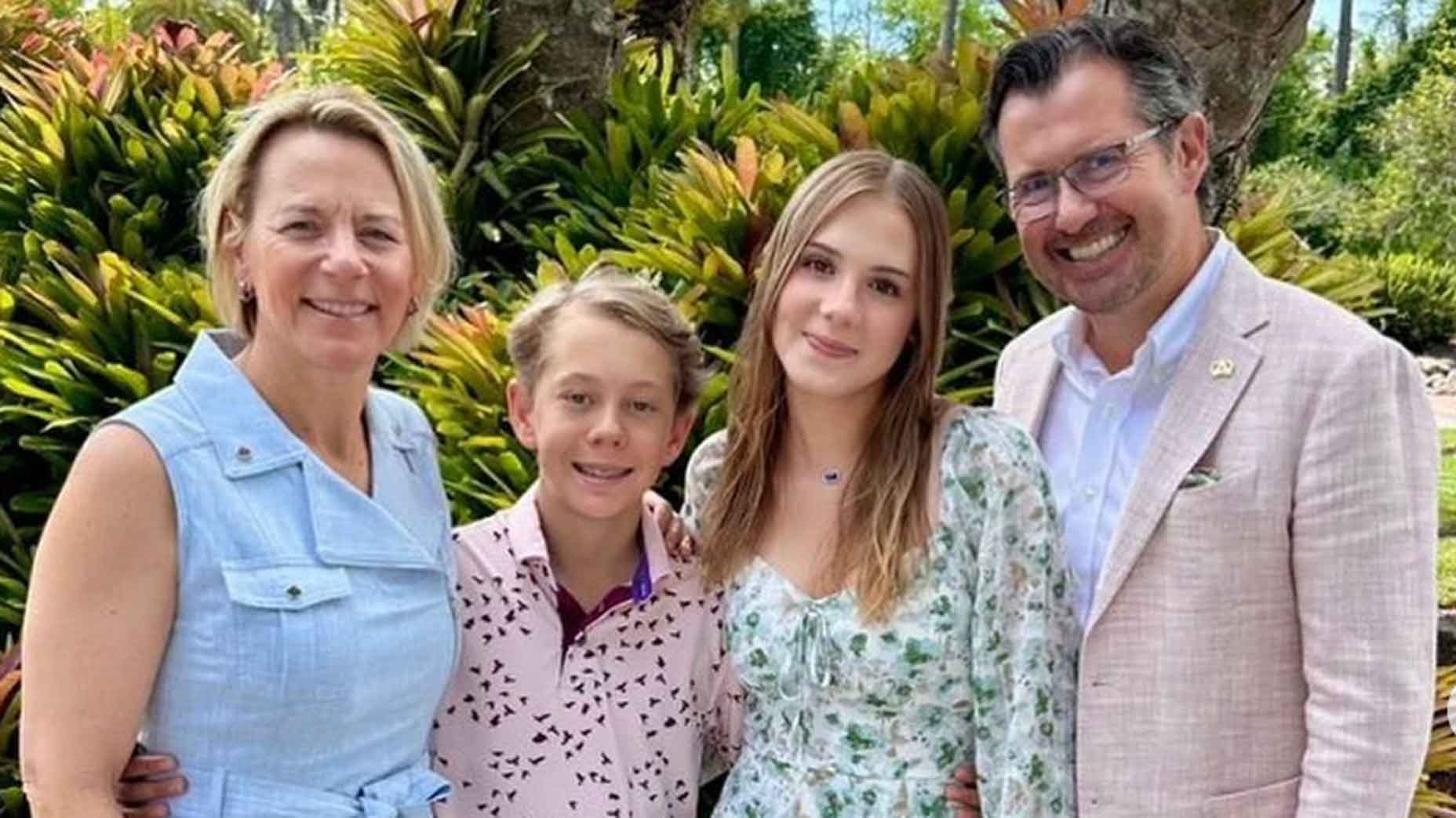
Your son Will was born 13 weeks premature, and spent nearly two months in the NICU. You’ve been very open about how difficult that was. How did that experience shape your perspective as a mother?
Being a mom for the first time is a big change. And we finally got the hang of it, and then I was pregnant with Will and then we have this difficult birth and just putting it in a different spin. And so yeah, there was a little tougher time for everybody. But we just stuck together and had good help, support at home. But you realize that one plus one is not necessarily two when it comes to kids. One plus one all of a sudden is like, three. Right? Especially when they’re so close, because one is starting to walk. It was a lot of work. And then at the time, we’re trying to still do a little work. I still have my sponsors. I still have stuff. So it was interesting. But a lot of mothers go through it. I’m not the only one and won’t be the last. But it’s that juggle, be able to have a partner that you can rely on and take turns, because I think at the end of the day, you dedicate yourself to be a mom. But I think you also have interests or maybe jobs and you still have to have your own personality. It’s very easy to just lose yourself when you have kids. You have needs, too. So it’s important to have a partner say, “Go out and do your thing for a while. I’ve got it.” And vice versa. So I think that’s been very helpful on our end here.
You returned to competitive golf in 2021, winning the inaugural U.S. Senior Women’s Open. What made you decide to come back?
I did use the word “step away,” and I didn’t have any intention of coming back, because at that time, there was no U.S. Senior Women’s Open and there really wasn’t anything else. And I was done. I had achieved everything I wanted to achieve. It was just not on my agenda. But I would say the biggest thing was Covid came. And golf was one of the few things that we could do as a family, being outside. And then Will really has a great interest in the sport and Ava a little bit, too. So we played as a family. And then I realized that maybe I need to practice a little bit. My game was a little rusty. And then I turned 50 and I thought, “You know what? I need to support the USGA.” The USGA has been so great to me throughout the years. And if they start this tournament, then I should really support it. So I would say that those three things just led to, “Well, let’s give this a shot.”
What was it like to start that grind again, at 50?
It’s certainly been harder. Not to say that I didn’t think it would be hard, but certain things you’re like, “Well, I’ve done this,” right? It just tells you it’s hard to be a mom and to try to play and to do all the different business together. I don’t have as much time as I need to to practice. So, therefore, you see it in my performance and my game. And it makes it difficult. You just have to set the bar differently, set the goals differently and accept where I am. And I certainly play golf for a different reason now than I did then. Now it’s more about family. We do this together. The kids love it. And I’m practicing with Will. So the purpose is very different. And it’s fine. This is this chapter, and I’m cool about it. I’m fine because I’ve had my career when it was Annika 100 percent every single day. But it’s not about Annika and her golf 100 percent. It’s more about helping him, and family.
Watching you and Will, 13, has been a big highlight at the PNC Championship. In December, you gave a touching interview together, where he said that playing with you is the best week of his year. How gratifying is it to play alongside him on such a grand stage, and to help him develop his game?
As a parent, you’re proud of your kids most of the time. And it’s just fun to see them grow up as their own individuals with their own thoughts and needs and desires and behaviors and attitudes and personalities. All of those things. It’s fun to see with all the hours that we put in to form them. We try to teach them manners, et cetera. So for us to just see, first of all, Will to have found a passion. It warms my heart. He beams every day going to golf. He just can’t wait. And the other day, he says, “I was born for golf, Mommy.” Not necessarily just to be a professional, but just he loves the game so much. He just loves it. And to see your kid be excited about something is so important. And then to be able to do it together. This has been a passion of mine for many years. And then to do it together and we’re both very competitive and it just warms my heart. And it’s just fun and we cherish the moments together.
I noticed that in your personal Instagram description, you wrote “Happy wife and mother.” No mention of your Hall-of-Fame career. Is there anything in your golf career that can compare to the satisfaction that you receive from your family life?
I’m super proud of my career. I’m very lucky and fortunate that I got so much out of my career. And there are so many moments that have been awesome. All the years of travel and accolades and friends and memories. So many of them. But that was then. It’s almost like there’s two people. Because I didn’t know what it was like to have a family like I do today and share it. But now I do. So it’s different. When I played in the U.S. Women’s Senior just after Covid when it started in 2021, for me to walk that fairway with Mike carrying my bag and the kids, we have no ropes there. So the walk on the fairway, to walk with me, if I would compare that, that is winning my first U.S. Open. It might be easy for me to say because I’ve achieved the other part, but I wouldn’t trade the things I do today when we hang out with the kids for playing on LGPA. It was then and this is now.
You’ve said that the decision to start playing competitively again was made as a family.
I asked them, “How would you feel if Mommy played in the Senior Open?” They were like, “Yes, cool!” “But this needs to be a family effort.” And they’re like, “What do you mean?” I said, “Well, sacrifices, because I have to go practice. I have to play in some other tournaments to be ready.” And I said, “So I need your patience and I need your participation. You have to come with me. And I’m not going go out there traveling on my own, because I’ve already done that. It’s not what this is about.” I had everybody’s thumbs up, like, we’re doing this. So that win was for all of us, if that makes sense, because they saw the effort that was put in. And it’s so cool because Will had said before, “Mommy, I’ve only seen you play on YouTube.” That put things in perspective.
Is there any piece of advice that you can offer to others when it comes to achieving the personal and professional success that you’ve had?
There are lots of ways to skin a cat. You have to find your own way. But the positive part of that is, it can be done different ways. And a lot of people think it has to be done only one way and somebody else’s way. I think we’re all individuals and you can find your way. If your will is strong enough, you can get things done. But I think goals, in general, have to come from your heart. They have to have a meaning. I think a lot of people just throw things out and it’s like, well, does it mean anything? And if it doesn’t, then it’s hard to put the effort into it. But I would encourage people to set goals, because it’s a great roadmap. It helps. And I always talk about this to our kids. Short-term goals and long-term goals. A lot of people just start with the long-terms, which is fine, and then they leave it at that. And it just seems so far-fetched to get to. A lot of people just lose energy or they don’t have the faith that they can get there. So add some short-term goals, so it’s like you take a step at a time and eventually get to the top of the ladder. And it works really well. Not just in golf, but in life.

